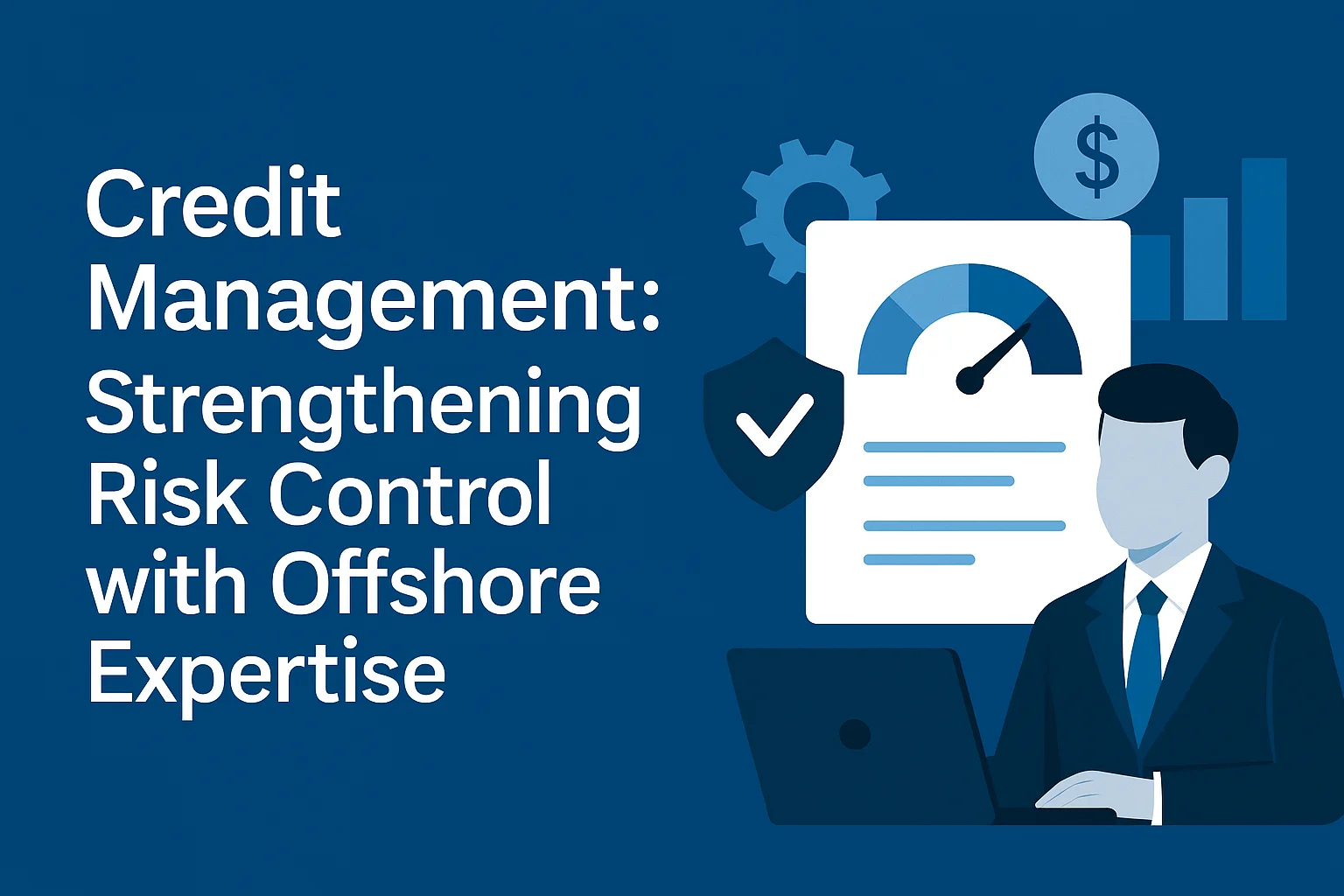Efficient credit management is essential for maintaining healthy cash flow and minimizing bad debt risks. Businesses that lack structured credit processes often face late payments, excessive write-offs, and strained customer relationships. As organizations scale, handling multiple clients across geographies makes credit risk assessment and control increasingly complex.
An offshore credit management team provides specialized expertise, cost efficiency, and scalability, enabling businesses to manage credit exposure proactively while reducing operational overheads. In this blog, we explore how offshore teams help strengthen credit risk management processes and ensure long-term financial stability.
1. Build a Strong Foundation for Credit Policy
A clear, documented credit policy is the backbone of effective credit management. Offshore credit teams help organizations design, maintain, and enforce policies that balance revenue growth with risk mitigation.
- Risk-based customer segmentation: Categorizing customers based on payment history, financial health, and market reputation.
- Credit limit setting: Leveraging financial analysis and credit scoring models to assign safe credit thresholds.
- Terms and conditions alignment: Defining payment periods, penalties, and discounts to encourage timely settlement.
By outsourcing policy management, businesses ensure consistency across regions and avoid ad-hoc credit decisions that lead to high exposure.
2. Conduct Comprehensive Credit Assessments
Creditworthiness evaluation is a data-intensive process that often overwhelms in-house teams. Offshore experts handle credit analysis and approval workflows, ensuring that risky customers are identified before exposure builds up.
- Financial statement analysis: Reviewing balance sheets, cash flow, and profit trends for early risk indicators.
- Third-party credit bureau checks: Accessing credit reports for objective scoring.
- Behavioral data review: Tracking previous payment performance and industry reputation.
This data-driven approach minimizes guesswork, ensuring credit is extended only to reliable customers.
3. Monitor Receivables in Real-Time
Even approved customers can become risky if their payment patterns change. Offshore credit management teams provide continuous monitoring of outstanding balances to detect early warning signs.
- Automated aging reports: Highlighting overdue invoices by customer and risk level.
- Flagging deteriorating accounts: Identifying customers with slowing payments or growing disputes.
- Escalation protocols: Alerting finance leadership for intervention before bad debt risk escalates.
Proactive monitoring helps businesses intervene before receivables turn into losses.
4. Enhance Collections with Targeted Strategies
Efficient collections are a vital part of credit management. Offshore teams improve recovery rates by implementing structured and customer-friendly approaches:
- Early reminder schedules: Automated follow-ups before due dates.
- Multi-channel outreach: Combining emails, calls, and portal notifications to prompt payments.
- Negotiation support: Offering structured payment plans for at-risk customers.
With specialized offshore resources focusing on collections, DSO (Days Sales Outstanding) can be reduced significantly, improving working capital.
5. Leverage Technology and Automation
Modern credit management relies on integrated tools and analytics, which offshore teams can deploy and manage effectively:
- Credit scoring systems: Automating risk assessment for faster decision-making.
- ERP and CRM integration: Ensuring seamless flow of order, invoice, and payment data.
- Predictive analytics: Using AI to forecast potential defaults or identify high-risk customer segments.
This tech-enabled approach enhances accuracy and scalability, making credit decisions faster and more reliable.
6. Strengthen Compliance and Reporting
In regulated industries, compliance with financial standards is non-negotiable. Offshore teams support audit-ready documentation and reporting, ensuring transparency and control.
- Detailed audit trails: Recording all credit approvals, adjustments, and policy deviations.
- Management dashboards: Providing leadership with real-time visibility into exposure, aging, and risk concentration.
- Regulatory compliance: Adhering to local and international financial regulations.
7. Free Up In-House Teams for Strategic Decisions
By delegating credit operations offshore, in-house finance teams gain time for strategic financial planning:
- Developing stronger customer relationships to reduce disputes.
- Designing innovative credit offerings to drive sales.
- Negotiating better terms with clients and suppliers based on data-driven insights.
This shift from operational firefighting to strategic management enhances profitability and long-term growth.
Key Takeaway
Credit management directly impacts your bottom line, cash flow, and business resilience. Offshore credit management teams provide specialized expertise, structured processes, and real-time monitoring, allowing businesses to extend credit wisely, minimize defaults, and strengthen collections without overburdening internal teams.
By combining offshore execution support with technology-driven analytics and strong governance, companies can scale safely, improve working capital, and reduce financial risk exposure.



